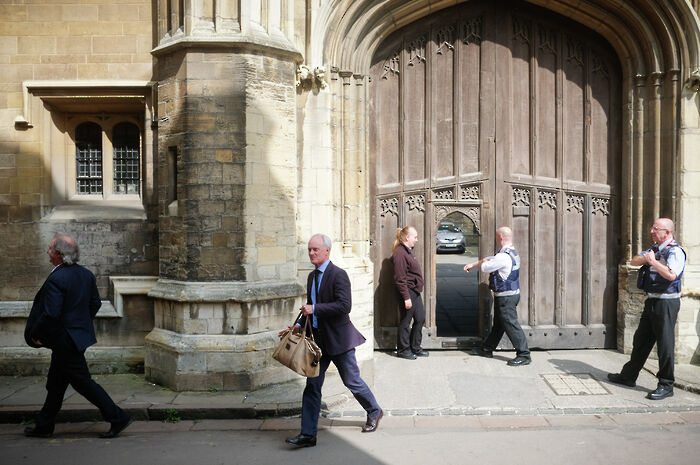Delayed Council decision confirms Cambridge will not divest
The University has said that will not eliminate its indirect investments from tar sands and thermal coal, confirming media reports

After almost a week’s delay, Cambridge announced today that it will “continue its policy” of keeping indirect investments in tar sands and thermal coal industries “to the bare minimum”, confirming reports on Friday of little development to the University’s previously stated position on divestment from the sector.
The University’s previous stance, outlined in a May 2016 report, said that it had “no exposure to the most pollutive industries” in its directly-held investments, and that in its indirect investments, the University had “no holdings in tar sands companies and only negligible holdings in thermal coal companies”, with any future holdings “expected to be negligible”.
In their announcement, the University stated it currently holds no direct investments in the fossil fuel sector, marking a change in its previous stance – that it has “negligible” exposure to fossil fuel industries. In addition, it stated that any changes to its absence of investments in the fossil fuel sector “must be referred back to the Council”.
CUSU President Daisy Eyre and Graduate Union President Dr Darshana Joshi dissented from the Council’s decision, arguing that “Cambridge is taking a reputational, financial and ethical risk by not fully divesting”. Council members Professor Nick Gay and Dr Alice Hutchings also submitted a note of dissent, criticising the Chief Investment Officer for refusing to disclose “information about the identity of the secondary fund managers used by CUEF”.
In today's announcement, the University has also rejected recommendations by its divestment working group that it commit 10% of the Cambridge University Endowment Fund (CUEF) to explicitly Environmental, Social, and Governance (ESG) funds – funds which take into account socially-conscious standards – arguing that the “sector is underdeveloped” and has ”an uneven track record”. Cambridge will instead hire an ESG fund officer, as reported on Friday. It will also establish a Centre for a Carbon Neutral Future.
It has also rejected the report’s suggestions that none of its indirect investments should lie in thermal coal or tar sands, arguing: “it is inevitable in a diversified and indirectly managed investment portfolio that some exposure may appear in some funds and therefore it is not possible to demand absolute exclusion”.
Cambridge Zero Carbon sharply criticised the Council’s announcement today as “watering down the proposals of its Working Group” and “hiding from democratic accountability”. They added, “Cambridge is not just failing to lead, but failing to follow”, claiming that the decision “marks a day of shame for our University.”
Cambridge's statement asserted that as “the financial sustainability of the University depends on strong returns from its investment strategies”, and because endowment returns in recent years have been “a critical component” in helping fund research and education, it would be imprudent to take further steps toward full divestment.
The divestment debate has catalysed criticism of the University’s decision-making processes, as campaigners have argued that the Council decision is indicative of an institution with little democratic accountability, as it runs counter to a pro-divestment Regent’s House Grace and CUSU motion, both passed last year.
The Centre for a Carbon Neutral Future, recommended by the divestment working group, will combine research on sustainability which takes place across the University and will engage “with forward-looking energy companies” in contributing to the fields of climate change adaptation and mitigation. Cambridge will also look to join the Institutional Investors Group on Climate Change (IIGCC), a body which works toward a low-carbon future by amplifying the investor voice and collaborating with policy makers, or a similar body.
Direct action to influence the Cambridge’s position on divestment had escalated in recent months ahead of the Council’s decision. Last month, three members of Cambridge Zero Carbon Society went on a six-day hunger strike to pressure the University to divest, while a number of campaigners staged a seven-day occupation of a key administrative building before being forcibly evicted.
In its announcement today, the University said: “Climate change is one of the most pressing problems facing humanity.” It added, “consistent with its mission to ‘contribute to society’, the University of Cambridge has a responsibility to use its position as one of the world’s foremost academic institutions to take a leading role in achieving a carbon neutral future.”
 News / Judge Business School advisor resigns over Epstein and Andrew links18 February 2026
News / Judge Business School advisor resigns over Epstein and Andrew links18 February 2026 News / Gov grants £36m to Cambridge supercomputer17 February 2026
News / Gov grants £36m to Cambridge supercomputer17 February 2026 News / Hundreds of Cambridge academics demand vote on fate of vet course20 February 2026
News / Hundreds of Cambridge academics demand vote on fate of vet course20 February 2026 News / CUCA members attend Reform rally in London20 February 2026
News / CUCA members attend Reform rally in London20 February 2026 News / Union speakers condemn ‘hateful’ Katie Hopkins speech14 February 2026
News / Union speakers condemn ‘hateful’ Katie Hopkins speech14 February 2026











